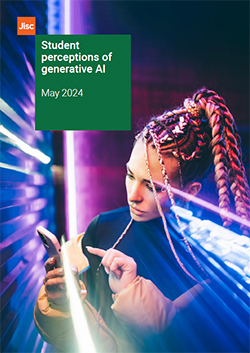Student perceptions of generative AI
This report provides an update on how students are currently using generative AI and explores its potential impact on their learning experience.

Following our initial student perceptions of generative AI report last year, we recognised the need to continue the discussion with students/learners as the technology continues to evolve.
Over this past winter, we ran a series of nine in-person student discussion forums with over 200 students across colleges and universities to revisit student/learner perceptions of generative AI. Our goal was to understand if and how views on generative AI have shifted, identify emerging usage and concerns, and explore the developing role students/learners want these tools to play in their educational experience.
As institutions grapple with developing policies and guidance and the complex pedagogical shifts, capturing the authentic student voice remains crucial to inform responsible AI integration that both empowers students/learners and maintains academic integrity.
Key changes since Spring 2023
The adoption of generative AI in education by students/learners is undergoing a remarkable transformation, mirroring the rapid evolution of the technology itself. Over the span of just nine months, since our previous report we have seen a distinct change in how students are utilising generative AI, and a maturing expectation of their institutions to support them in their journey into employment in an AI enabled world.
- Transition to collaborative learning: Students/learners increasingly view generative AI as a collaborative tool to coach and support active learning and critical thinking, using these tools as a digital assistant rather than seeing them purely as answer providers.
- Emphasis on future skills: Students/learners emphasised the importance of generative AI-ready skills relevant to their future industries. There’s a growing demand for an education to integrate generative AI across the curriculum and reflect the AI enabled world we all now inhabit.
- Ethics, equity, and accessibility concerns: Students/learners are increasingly aware of and concerned about equity, bias, and accessibility issues related to AI, advocating for measures that address these challenges to ensure a safe, inclusive, and responsive educational experience.
- Comprehensive integration and educator competence: There’s a clear expectation by students/learners for comprehensive generative AI integration across education, with competent usage by educators and policies that ensure a fair and effective AI-enhanced learning environment.
Read the full report
pdf, 1.9MB, 13 pages